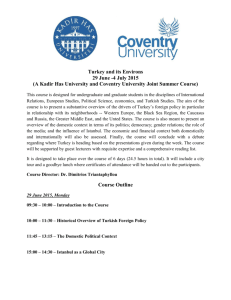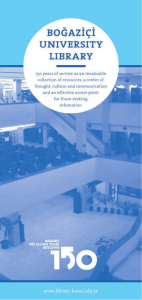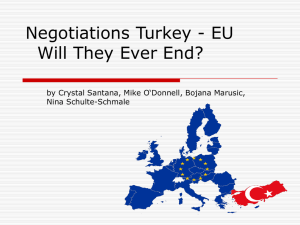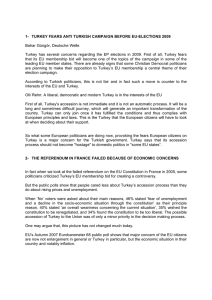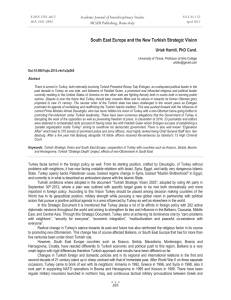Turkish Accession
advertisement
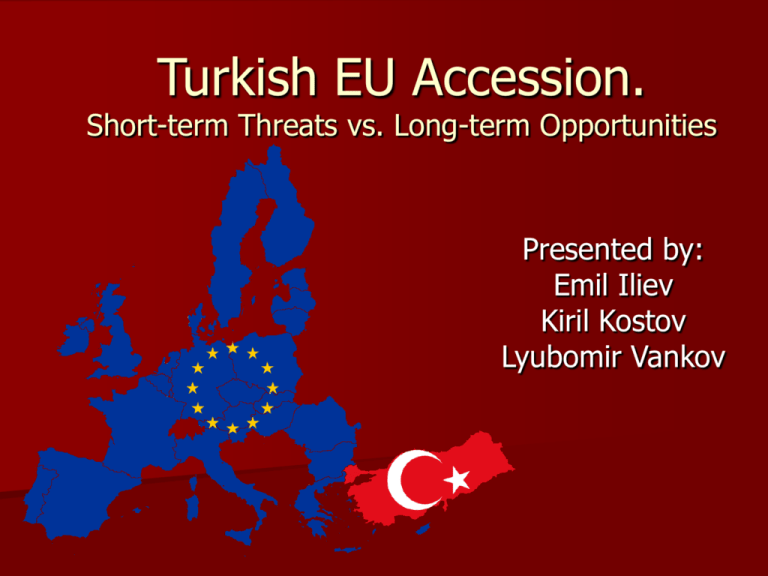
Turkish EU Accession. Short-term Threats vs. Long-term Opportunities Presented by: Emil Iliev Kiril Kostov Lyubomir Vankov Background 1987 – Turkey applied for accession to the EU 1999 – Turkey became a candidate country 2005 – Start of official negotiations for Turkish entry Negotiations expected to take 10-15 years Europe is far too short-sighted GDP Per Capita Lowest GDP Per Capita Mass immigration into Europe Flood of labor markets Lower real wages in Europe Demographics 72.6 Million Almost equal to 2004 Enlargement 99% Muslim – will change religious balance within the EU from 3% to 20% Muslim Unemployment 10.2% Unemploym ent Highest after Poland and Slovakia Coupled with large population – will flood EU with poor labor Geopolitics Only 3% of Turkey is geographica lly in Europe Does not include Ankara Will extend EU border to Syria, Iraq, Iran, Armenia, Georgia YES to Turkish Accession Turkey Reforms 1999 – National Programme for the Adoption of the EU Acquis Abolition of death penalty Expanded freedom of expression Curtailment of power of military Release of political prisoners More freedom for the use and study of Kurdish Looking for solution to Cyprus Turkey is an important ally NATO member since 1952 Pro-Western and increasingly democratic Full support for the “war on terror” Contributed to military and peacekeeping actions on the Balkans and Afghanistan EU should use its leverage to export its values to Turkey The EU Needs Turkey To increase its leverage as a normative power To further its value-driven policies To obtain a critical strategic partner “ to modernize an Islamic country based on the shared values of Europe would almost be a DDay for Europe in the war against terror, [because it] would provide real proof that Islam and modernity, Islam and the rule of law . . . [and] this great cultural tradition and human rights are after all compatible” Joschka Fischer – German Foreign Minister until 2005 “the accession of Turkey would be proof that Europe is committed not just in word but in deed to a Europe of diverse races, cultures, and religions all bound together by common rules and a sense of human solidarity and mutual respect.” Tony Blair – UK Prime Minister Turkey as a Strategic Partner Large Army – 400000 standing troops Physical Presence in Middle-Eastern and Caucasus-Caspian Region Geopolitical Significance to the Balkans, eastern Mediterranean, Middle East, Russian Region Turkey Membership – more confident and expansive EU policy in the region Turkey will provide capacity, local knowledge and foreign policy experience in dealing with the Middle East Major Growth Market Rapidly modernizing economy 7 % growth > average EU growth $17.1 billion FDI in 2006 $86 billion exports Less textile, more electronic exports Turkish Foreign Trade EU Countries $87.1 46,3% 53,7% BILLION $101.3 BILLION Total $188.4 BILLION Other Countries Energy Crossroad Crucial for EU future energy security Positioned near all major oil & gas areas Solution to EU demographic Crisis Young, educated Turkish labor force EU showing future deficit parallel to aging population High future EU demand for Turkish workers Other Economic Benefits Already highly integrated economy shared Customs Union with EU Potential logistics centre in trade between EU and the Caucasus, Middle Asia and the Middle East High consumption behavior “Absorption Capacity” If EU could take 10 new states at a single time, with overall population of 110 million, than Turkey with its 75 million should NOT be a problem as continuously stated. Nothing about Size or Relative Wealth in the Copenhagen Criteria Thank You for the Attention





